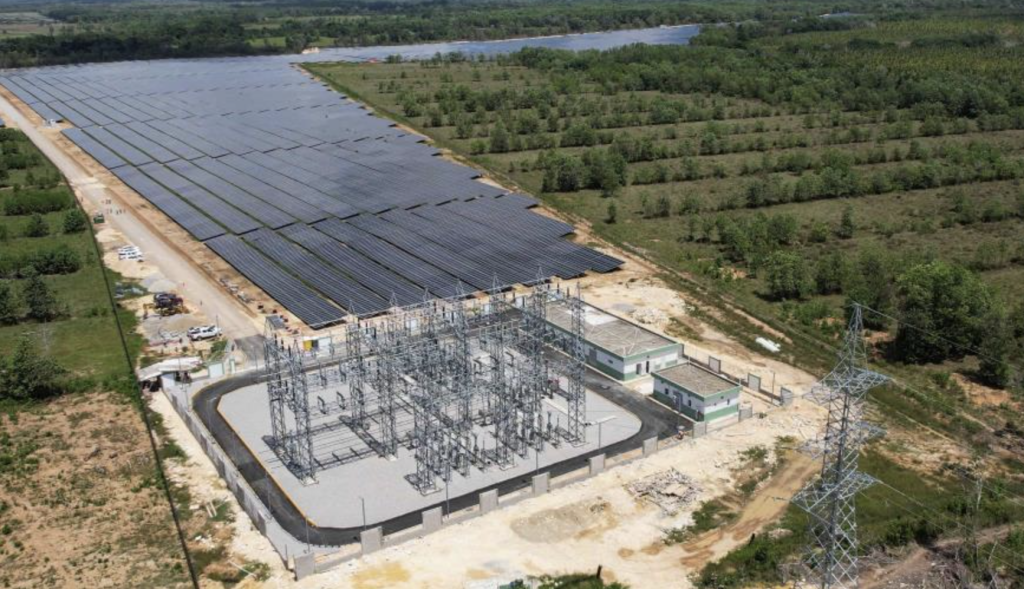
The Dominican Republic is experiencing an unprecedented surge in investment in its energy sector, attracting substantial foreign and local capital, particularly in renewable energies. A staggering 24 new power generation plants or parks are currently under construction across the nation, representing a major investment of US$3.38 billion, Diario Libre reports.
From 2022 to 2024, the energy sector emerged as the second-largest recipient of foreign direct investment (FDI) in the Dominican economy, trailing only tourism. However, in the first quarter of 2025, the energy sector remarkably surpassed tourism, claiming the top spot as the primary generator of FDI for the country.
This influx of foreign investment has propelled the construction of these 24 new facilities, which boast a combined concessioned capacity of nearly 2,300 megawatts. While foreign capital accounts for a significant portion of these projects, local entrepreneurs have also been drawn to the sector, contributing at least US$1.08 billion, or 32.1% of the total investment.
Renewable sources—solar, wind, and urban solid waste—are the driving force behind this expansion, with 21 projects currently underway. The remaining three projects are thermal units, utilizing natural gas and fuel oil, according to data from the National Energy Commission (CNE).
While these energy projects are spread throughout the Dominican Republic, two provinces, Santo Domingo and Peravia, lead the charge with five projects each. The remaining 14 projects are distributed across nine other provinces.
In Greater Santo Domingo, the five ongoing projects represent an investment of US$674.2 million. Four of these will harness solar energy, while one significant natural gas plant, located in Boca Chica, is projected to cost US$330 million. Peravia is home to five solar parks under construction, totaling US$413.5 million. Together, these two provinces account for US$1.08 billion in electricity generation investments.
María Trinidad Sánchez ranks third in terms of energy projects under construction, hosting three solar ventures with investments totaling US$274.6 million. San Pedro de Macorís, Azua, and Santiago each have at least two electricity generation projects underway. Notably, Santiago is building a project that will utilize solid waste for energy production, with a US$274 million investment.
The CNE’s data also indicates that the remaining five parks are being built in La Romana, San Cristóbal, Duarte, Valverde, and Montecristi. Montecristi’s project stands out as the most expensive of the 24, with a US$585.5 million investment in a natural gas-fired plant.
Of the projects currently under construction, at least 13 are backed by foreign capital, distributed among 11 companies. Eight projects are attributed to five national companies, including three from the Haina Electricity Generating Company, according to a survey conducted by Diario Libre on the origin of the concession-holding firms.
Spain leads the list of foreign nations with the highest number of developers participating in these generation park constructions, either directly or through the establishment of firms on Dominican soil. Five Spanish companies are involved in six solar projects, with an investment reaching US$439.6 million.
Other international contributors include France, with investments of US$156 million for two solar parks; Colombia (US$139 million); the United States (US$219 million); Panama (US$221.8 million); the British Virgin Islands (US$330 million); and Germany (US$107.9 million), with each of these last five countries contributing one project.
Among the prominent local companies investing in the sector is Energía 2000, which is constructing a natural gas-based plant in the municipality of Manzanillo. This facility is expected to add 360 megawatts, making it the largest single contributor to the national electricity system among the units currently under construction.
Diario Libre reports that the Dominican Republic’s commitment to renewable energy is underpinned by Law 57-07, the Incentive to Renewable Energies and Special Regimes Law, enacted 18 years ago. This legislation aims to stimulate private investment in the sector by offering benefits such as a 100% import tax exemption on equipment, machinery, and accessories necessary for non-conventional energy production.
Read more in Spanish:
Diario Libre
30 July 2025

